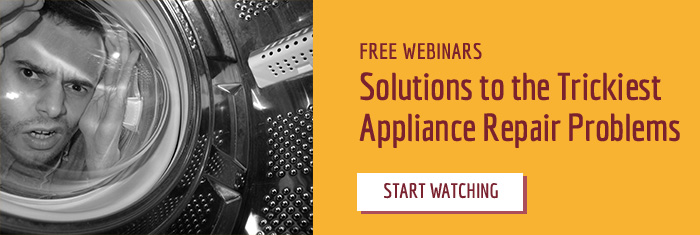Learn Samurai's Secret that Stops the Stink in Your Front-Load Washer
One of the most common complaints I hear people make about front-load washers is about odor: stinky basket, stinky door gasket, stinky towels, stinky underwear... okay, I'll stop there.
In almost every case, when I see (smell) this problem on service calls, they all invariably have the same cause: incorrect detergent usage, either too much or the wrong kind.
For front-load washers (and HE top-loaders), you should only be using HE detergent.
And, no, using less of the regular stuff is not the same thing because washing clothes in a low water environment requires a special chemistry, which is what the HE detergents are engineered to do. I don't understand why someone would spend over $1,000 for a front-load washer and then try to shave shekels buying cheap detergent. That's what we call penny-wise and dollar-dumb.
I'll hear some Appliantologists say that you should only use powdered detergent, sometimes they'll even recommend a specific brand, like Tide. This is well-meaning but misguided misinformation. Using powdered or liquid HE detergent is not the issue because the chemistry is the same. What does matter is using the correct amount of HE detergent for your water hardness quality. The general guidelines are:
HE detergent: 2 tablespoons
HEx2 (double concentrated): 1 tablespoon
HEx3: 1 teaspoon
Unless you know for a fact that you have very hard water where you live (defined as > 10.5 gpg, more details in this post), then the most HE detergent you should ever use, powder or liquid, is 2 tablespoons.
The number one problem that people don't seem to get is that they are using too much detergent, whether powdered or liquid. Even if it is HE, too much will cause odor problems.
FWIW, we've been using liquid HE detergent in our front loaders for the past 15 years and never had even a whiff of an odor or mildew issue. But we have always implemented the 9 odor-beating techniques AND always remove the clothes from the washer as soon as they're done.
It's also important that your detergent is fresh, and if you use powdered, it must be kept completely dry. If the powder gets damp while in storage, it loses most of its punch.
Pop quiz:
Q. What's the biggest single difference between HE and non-HE detergents? Give up?
A. HE detergent has additives specifically designed to suppress sudsing because sudsing interferes with the mechanical action of removing soils from fabrics.
Okay, here's another one:
Q. What do most people like to see when they do laundry?
A. SUDS! Lots and lots of suds. They open the lid or look through the glass and don't see suds, what do they do? Yep: add more detergent until they see suds. Then they wonder why their clothes stink.
Fun Fact to Know and Tell (FFTKAT): Detergent contains most of the necessary ingredients to support microbial life. In other words, it's bug food. What do bacteria do as they grow? Like all life forms, they produce waste products. Sometimes, this is a good thing, like in the case of making beer. But other times, it's a bad thing, like in the case of making stinky laundry.
The detergent manufacturers are partly to blame here, too. They put idiot directions on the label instructing the customer to use too much. Supposedly, the usage instructions are based on a North American average of water hardness. I'm not sure I believe that. The amount they say to use would be appropriate for areas with extreme hard water. For most areas, the amount on the label is three to four times too much and causes all kinds of problems, including odors and the infamous F35/sud error code in Whirlpool steam washers...
-
.png) 1
1







2 Comments
Recommended Comments